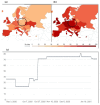Is There a Direct Link between Sexual Satisfaction and Restrictions during the Second Wave of the COVID-19 Pandemic?
- PMID: 35805440
- PMCID: PMC9265595
- DOI: 10.3390/ijerph19137769
Is There a Direct Link between Sexual Satisfaction and Restrictions during the Second Wave of the COVID-19 Pandemic?
Abstract
Background: Research suggested that the COVID-19 pandemic-related restrictions decreased sexual function and satisfaction. The present study examines the direct relationship between sexual satisfaction and restrictions during the second wave of the COVID-19 pandemic. Methods: A cross-sectional study was performed in Poland between 3 September 2020 and 18 January 2021. A convenience sample of 1364 adults, aged 18-67 (M = 25.13, SD = 6.45), among whom 62.39% were women, and 23.17% were single, completed anonymous web-based survey. The Sexual Satisfaction Questionnaire (SSQ) and Stringency Index (IS) were used to assess sexual satisfaction and the level of restrictions during the pandemic, respectively. Results: No direct association was found between sexual satisfaction and the level of restrictions during the lockdown. Sexual satisfaction was significantly worse among single participants than those living in a couple. No gender differences were found in sexual satisfaction. Conclusions: Future studies should examine an indirect association between sexual satisfaction and restrictions during the pandemic via stress and anxiety. Single relationship status should be considered a risk factor for sexual satisfaction, so single individuals should be a target group for prevention programs during the pandemic.
Keywords: COVID-19 pandemic; gender; lockdown; relationship status; restrictions level; sexual satisfaction; stringency index.
Conflict of interest statement
The authors declare no conflict of interest.
Figures



References
-
- Hale T., Angrist N., Goldszmidt R., Kira B., Petherick A., Phillips T., Webster S., Cameron-Blake E., Hallas L., Majumdar S., et al. A global panel database of pandemic policies (Oxford COVID-19 Government Response Tracker) Nat. Hum. Behav. 2021;5:529–538. doi: 10.1038/s41562-021-01079-8. - DOI - PubMed
-
- Aknin L.B., de Neve J.-E., Dunn E.W., Fancourt D.E., Goldberg E., Helliwell J.F., Jones S.P., Karam E., Layard R., Lyubomirsky S., et al. Mental health during the first year of the COVID-19 pandemic: A review and recommendations for moving forward. Perspect. Psychol. Sci. 2022 doi: 10.1177/17456916211029964. - DOI - PMC - PubMed
-
- Manchia M., Gathier A.W., Yapici-Eser H., Schmidt M.V., de Quervain D., van Amelsvoort T., Bisson J.I., Cryan J.F., Howes O.D., Pinto L., et al. The impact of the prolonged COVID-19 pandemic on stress resilience and mental health: A critical review across waves. Eur. Neuropsychopharmacol. 2022;55:22–83. doi: 10.1016/j.euroneuro.2021.10.864. - DOI - PMC - PubMed
-
- de Sousa G.M., Jr., de Oliveira Tavares V.D., de Meiroz Grilo M.L.P., Coelho M.L.G., de Lima-Araújo G.L., Schuch F.B., Galvão-Coelho N.L. Mental Health in COVID-19 Pandemic: A Meta-Review of Prevalence Meta-Analyses. Front. Psychol. 2021;12:703838. doi: 10.3389/fpsyg.2021.703838. - DOI - PMC - PubMed
-
- Gray B., van Ommeren M., Lewis S., Akhtar A., Hanna F., Fleischmann A., Chisholm D., Kestel D. Mental Health and COVID-19: Early Evidence of the Pandemic’s Impact: Scientific Brief, 2 March 2022. [(accessed on 1 June 2022)]. Available online: https://www.who.int/publications/i/item/WHO-2019-nCoV-Sci_Brief-Mental_h....
MeSH terms
LinkOut - more resources
Full Text Sources
Medical

